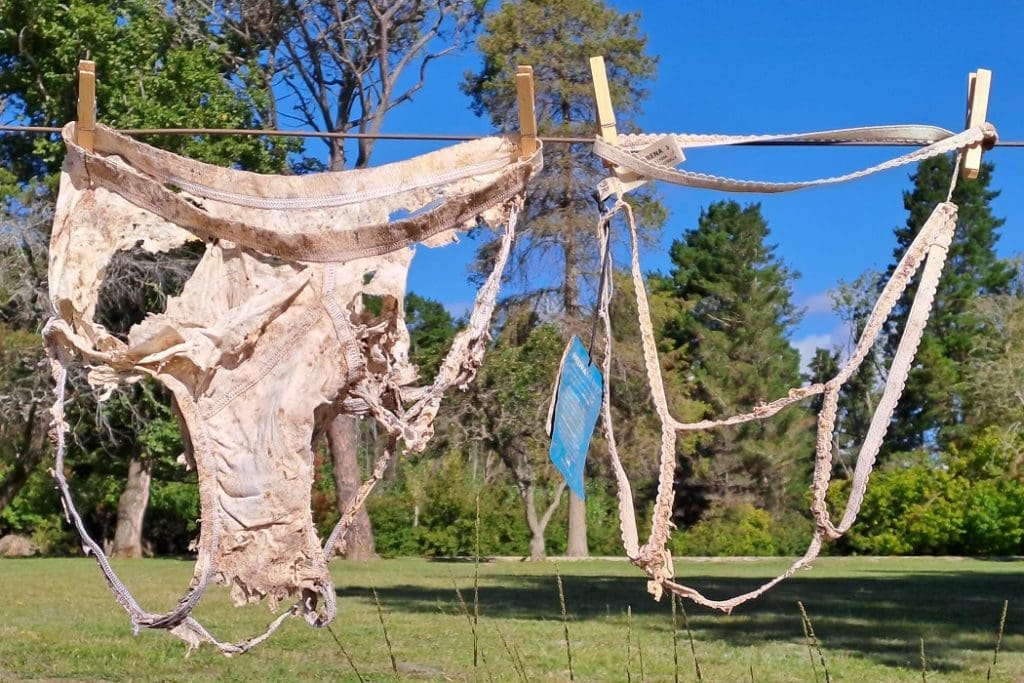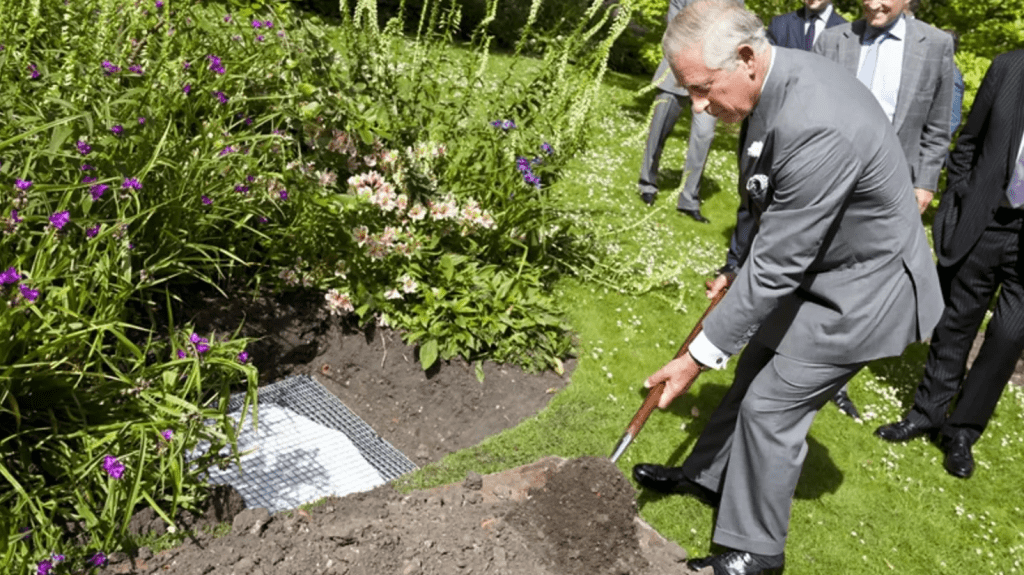
The dirty truth about natural fibre underpants – cotton undies on the left, what’s left of a wool set on the right. Source – UNE.
THERE are good reasons why soil buff Dr Oliver Knox doesn’t use wool underpants for his Soil Your Undies project to be outlined at the Sydney Royal Easter Show from this weekend.
The Soil Your Undies project is among several ag-orientated displays the University of New England will serve up in the Woolworths Ag Discovery Pavilion at the show.
It involves showing gardeners and landowners how to become at-home soil experts by burying their old cotton undies to illustrate how the rate at which the cellulose plant fibres break down indicates soil health.
Participants are encouraged to bury a pair of 100 percent white cotton undies in topsoil for two months and then check the level of decomposition, as an indicator of microbial activity. Rapid decomposition of the undies shows good biological activity, indicating healthy soil.

Prince Charles burying wool and synthetic jerseys or jumpers. Source – AWI.
Many in the wool industry would recall the now King Charles III (formerly Prince Charles) famously burying woollen and synthetic sweaters in his Clarence House garden for six months, to illustrate the biodegradability of wool and the comparative failure of buried synthetic garments to degrade.
Wool has soil nutritional advantages over cotton
Dr Knox, UNE’s Associate Professor of Soil Systems Biology and Cotton Hub co-ordinator, said from a soil perspective, wool has nutritional advantages over cotton.
He said cotton undies are used because people are familiar with them, their breakdown in soil is slower than wool and they are cheaper.
Dr Knox said some female wool growers sent him Merino wool underpants in 2019 after hearing about the project and he compared their breakdown in soil with cotton underpants.
“They (the wool underpants) broke down beautifully in eight weeks.
“It was gone in eight weeks, there was just the elastic stitching left,” he said.
“For the Soil Your Undies thing, wool is almost too good; wool as a natural fibre will generally break down quicker than cotton, because it is just nutritionally more complex and offers a more balanced diet for the soil microbes.
The Soil Your Undies project has now ‘soiled’ about 900 sets of cotton undies, Dr Knox said.
“We have about 300-plus of them here at the university that have been sent back over the years.”
He still displays the degraded woollen underpants with ‘soiled’ cotton, bamboo/elastane and cotton/elastane undies to highlight the degradation process and illustrate how elastane doesn’t break down.
“We’re really pushing the natural fibre benefits for us and the environment.
“Soil Your Undies is about getting people thinking about their soil beyond it being just bits of minerals and to think about it as a living ecosystem that carries out some incredible functions that we just kind of take for granted,” Dr Knox said.
Other UNE displays at the show will include:
- Soil health | 6-14 April: Dr Oliver Knox, the recipient of the 2022 Cotton Seed Distributors Researcher of the Year Award and Landcare Australia’s 2022 General Jeffery Soil Health Award, will be available from the 14-17th April to talk about his latest research into soil health and soil carbon. Award winning soil scientist, Dr Ivanah Oliver, will also be available to talk about UNE’s latest projects from the 6-14 April.
- Visitors will be given an insight into some of the most cutting-edge research, innovation and technology impacting the agricultural, environmental and rural health sectors, including UNE’s mini research harvester and live crops that are used to study root growth in various soils and conditions.
- Methane-reduction technology: From breeding more sustainable livestock, to feeding sheep and cattle methane-reducing seaweed. Come and see how UNE is measuring the methane output of livestock and hear about the innovative work we are doing to reduce emissions.
- Live insects: UNE’s pollination experts will show how native flies are being used to fill the gap left by the varroa mite on the mid-north coast of NSW. There will also be a beehive and live dung beetles.
- Bats as natural pest control in Australian vineyards | 7 – 10 April: 2023 Science and Innovation Award recipient, Dr Zenon Czenze, will unpack his latest research into how bats are being used as a form of natural pest control in Australian vineyards.
- Regional mental health | 12 April: Dr Sarah Wayland from the Manna Institute for Regional Mental Health will unpack what UNE is doing to improve mental health and wellbeing in rural, regional and remote Australia.
- Free health checks and ‘Smokerlyzer’: Come along and receive free blood pressure, pulse and oxygen checks, delivered by our experienced staff from the Faculty of Medicine and Health. Smokers will also be offered the chance to use the ‘Smokerlyzer’, which is a contraption that measures the amount of carbon monoxide in a smoker’s breath.
- Special specimens on display: The UNE Discovery Team will give visitors a taste of the UNE Natural History Museum by bringing along some of the university’s finest specimens.
- Trees on the Tablelands – Find out how UNE is helping to stabilise and restore threatened ecological communities of woodland plants in the New England Tablelands facing threats including clearing, dieback, fragmentation, exotic weeds and overgrazing.



HAVE YOUR SAY